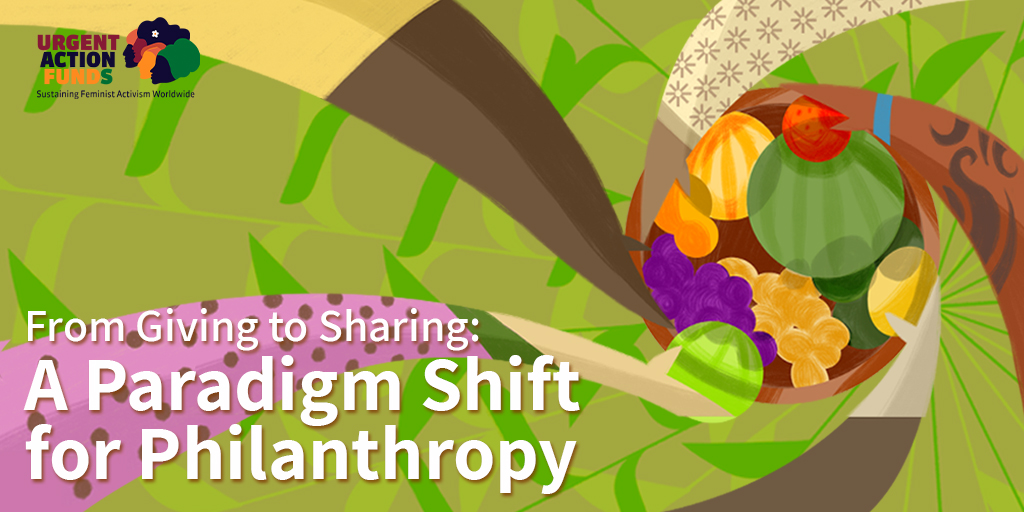Sharing sounds like a topic for a preschool lesson. But how does this concept transform philanthropy?

At Urgent Action Fund Asia & Pacific, we are conscious of the power inherent in how we frame ‘why and how we do what we do’. Talking about philanthropy as ‘giving’ feels like a transactional approach. Framing it as ‘sharing’ makes it transformative. And transforming the politics of resourcing is one of the feminist principles of philanthropy that is core to our work as the Urgent Action Fund Sisterhood.
Sharing embodies the principle that the people most affected by the issues are setting the agenda for the resources they need and how they use them. This is radically different from mainstream philanthropy where agendas are often set in boardrooms with people who are not directly affected, despite the lip service given to partnerships, listening, and learning. Giving creates a hierarchy of power, whereas sharing doesn’t. When we talk of philanthropy as redistribution of resources, it breaks the hegemonic power relationship between the resource-rich North and the ‘needy’ South. Redistribution and sharing do not give this ‘power over’ to those with resources; they don’t get to dictate agendas.
How do we translate this into practice? Our entire ethos of rapid response grantmaking is framed as sharing of resources – and we believe this is why it is radically feminist too. Our funding decisions are always taken in consultation with a wider network, where we take the ownership and accountability of consulting with our advisors, who are women, girls, and non-binary defenders working across the range of human rights movements that we fund. We have experienced how this sharing of power changes the way we work.
Sharing promotes a look beyond individual interests and needs. For instance, we initiated special grants to help activists and defenders tide over the hardships brought on by the Covid-19 pandemic. When the outbreak was disproportionately affecting some countries, such as India and Papua New Guinea, we realised we couldn’t define or narrow down on who we call a defender and who gets to claim resources. We sought the counsel of our Board and advisors, who pointed to numerous groups providing mutual aid on the ground. So in solidarity, we quickly created a short-term grant, and offered 10 grants to support mutual aid groups, supporting not only defenders but also wider communities. Though it was beyond our remit, we were intent on sharing resources further than the communities that we usually work with.
We saw the principle of sharing profoundly impact our response to the Afghan crisis. We were one of the first funds to successfully move money directly to activists across the country. This was only possible because of the networks of solidarity and care we had built with our Afghan advisors and peer donors. Our advisors shared generously of their time and relationships, taking on significant personal risk to conduct due diligence and coordination. In those first two weeks of crisis and hurriedly planned evacuations, they went beyond their mandate to use every possible contact in their phone books to get families out of danger. Also in solidarity, our sisters in the Urgent Action Funds and other feminist funds across the globe shared their networks and mobilized resources on our behalf, connecting us with donors who wanted to help. And in the spirit of sharing and learning, we offered our learnings from redistributing resources for Afghanistan to support women and non-binary human rights defenders to the wider philanthropic ecosystem that we are part of.
As we look ahead, we dream of further transforming the politics of resourcing by mobilising more philanthropic giving within Asia and the Pacific. We hope to activate national and regional resources through mobilising middle-class philanthropy. There are strong indigenous cultures of sharing in our regions that institutions like religion and sports have tapped into with great impact, from rituals of sharing with the less privileged like the Islamic practice of zakat during Ramadan to sports-based activism for charities. We believe that narratives around women’s rights and human rights defence need to be shifted and popularised to encourage support and giving. Over time, we hope that this collective culture of sharing will lead to communities embracing a more expansive and transformative agenda as we all share our resources with others.
Virisila Buadramo is the Co-lead, Partnerships and Resource Mobilisation, of Urgent Action Fund Asia & Pacific. Vinita Sahasranaman is the Co-Lead, Programs and Innovation, of Urgent Action Fund Asia & Pacific.
This blog is part of a series by the Urgent Action Funds, unpacking how they practice their recently launched Sisterhood Feminist Principles of Philanthropy in their day-to-day work. The Urgent Action Funds are a global consortium of feminist funds that provide rapid and responsive support for women and LBTQI+ human rights defenders in moments of need, sustaining feminist activism by supporting the resistance and resilience of frontline defenders.




Comments (0)